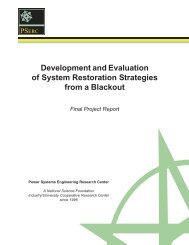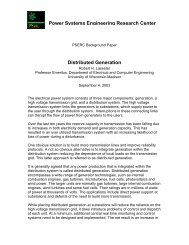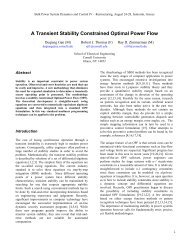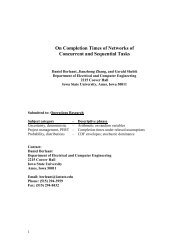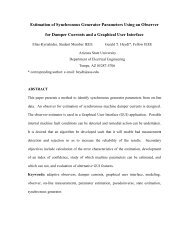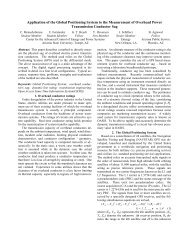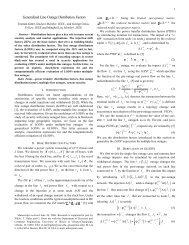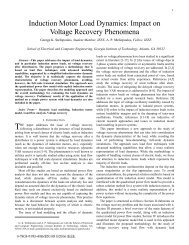Thrive: The Skills Imperative - Power Systems Engineering ...
Thrive: The Skills Imperative - Power Systems Engineering ...
Thrive: The Skills Imperative - Power Systems Engineering ...
You also want an ePaper? Increase the reach of your titles
YUMPU automatically turns print PDFs into web optimized ePapers that Google loves.
21<br />
Education and Market Advantage<br />
James L. Oblinger<br />
Chancellor<br />
North Carolina State University<br />
For many people, “globalization” conjures up images of worldwide competition<br />
for jobs, resources and markets. It holds out the promise of a more<br />
equitable, interconnected world and the challenge of preserving our position<br />
of economic, political and cultural leadership. It is only when we start to tease<br />
apart what globalization is that we start to get a better understanding of<br />
what it means for colleges and universities.<br />
Former Secretary of Labor Robert Reich recently said: “Underlying all the debates<br />
over globalization, and all the debates over trade and direct investment is this most<br />
important singular fact…if you are well educated…if you are well able to innovate,<br />
you are advantaged in the global economy. You have a larger and larger market for<br />
your intellectual capital.”<br />
Simply put, education and innovation are intrinsically linked. In a world connected primarily and increasingly<br />
by its problems, the successful global workforce is one that excels at problem solving—and solving today’s<br />
complex, global problems requires innovation.<br />
Developing a globally attuned, innovative workforce involves widening the scope of educational experiences<br />
for our students beyond our borders, giving them opportunities to confront and solve real-world problems<br />
and bring together other disciplines, insights and approaches in novel ways. Such opportunities are not<br />
limited to study abroad programs. Corporate, government and university partnerships can catalyze innovation<br />
and provide students with a unique perspective.<br />
Interdisciplinary education, research and collaboration help students expand their world view, as does creating<br />
opportunities for students to be entrepreneurial and work with practicing professionals. Corporate<br />
and government partners can model problem solving, mentor aspiring students, and challenge them with<br />
real-world, complex problems. But those same corporate partners benefit from the energy, enthusiasm and<br />
innovation our students bring.<br />
On Centennial Campus at North Carolina State University, we have evolved the corporate partnership concept,<br />
literally moving corporate and government partners closer to students and faculty. Global organizations<br />
physically become part of campus, providing an opportunity for students to see and understand not just<br />
the problem or the solution, but the process of innovation and problem solving. Having this unique, tangible<br />
connection provides additional relevance to students’ education. And corporations come to campus not just<br />
looking for a place to locate but with a mindset that includes student engagement, workforce development<br />
and innovation.<br />
MeadWestvaco, a global packaging firm, recently engaged students to help the company improve “at the<br />
front-end of innovation.” GlaxoSmithKline wanted interns with a background in computer programming,<br />
mathematics and facility with logic and cognitive science—students they found in the philosophy department—to<br />
help them turn ideas into action. Not only did the students gain valuable experience, the corporations<br />
gained as well. Innovation is not limited by age or position—it is catalyzed by diversity of perspective, a<br />
willingness to collaborate and a problem to be solved.<br />
A critical part of education is helping students understand and experience problem solving and innovation.<br />
Those who learn to innovate will prosper in a global economy. As we think about the education our universities<br />
provide, we should not forget the education our corporate and government partners can share.



